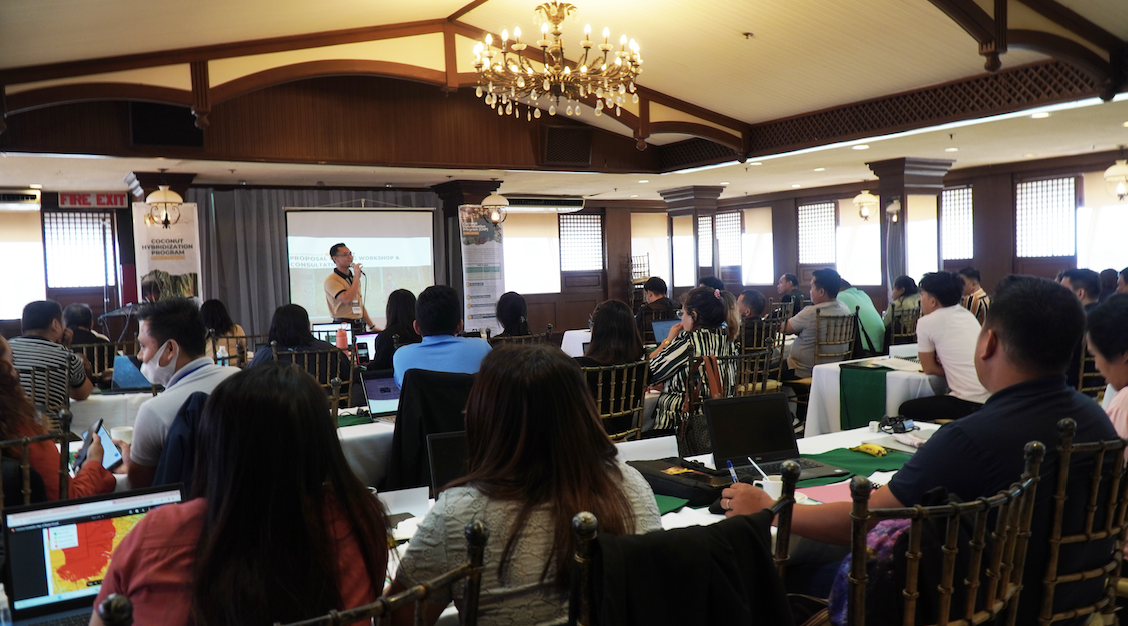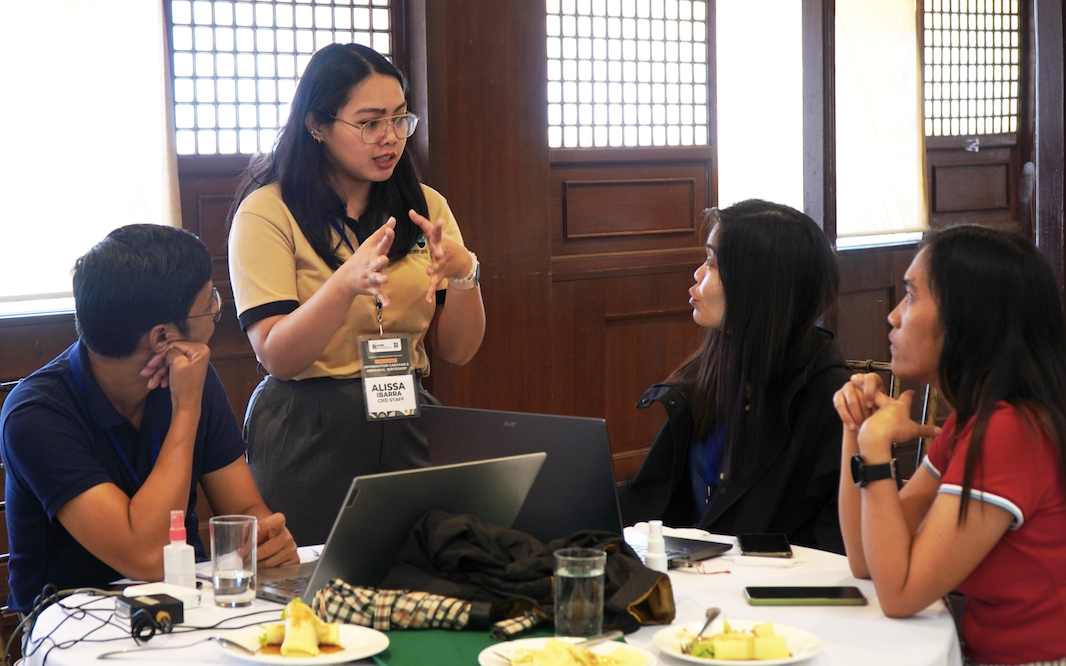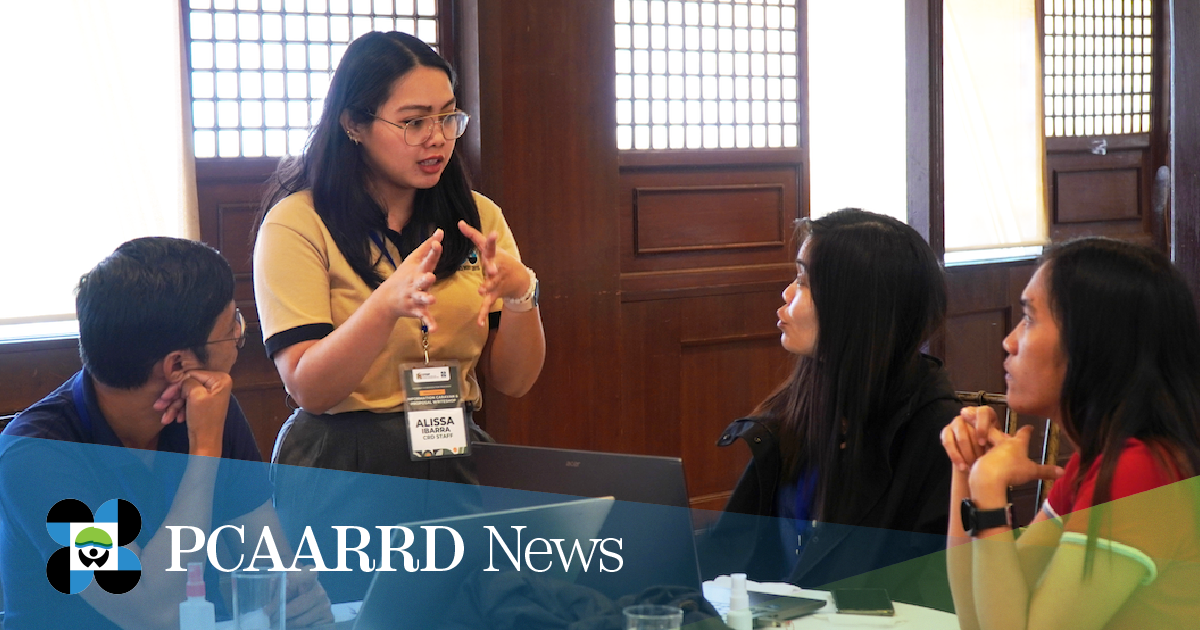Forty researchers from various state universities and colleges (SUCs) and research and development institutions (RDIs) in Northern Mindanao and Caraga regions participated in the Coconut Hybridization Program (CHP) Research Component Regional Information Caravan and Proposal Writeshop held in Cagayan de Oro City.

During the Coconut Hybridization Program (CHP) Research Component Regional Information Caravan and Proposal Writeshop at Cagayan de Oro City participated by universities and research institutions from Regions X and XIII. (Image credit: CRD, DOST-PCAARRD)
The two-day activity organized by the Philippine Council for Agriculture, Aquatic and Natural Resources Research and Development of the Department of Science and Technology (DOST-PCAARRD) provided an opportunity for dialogue and collaboration with universities, research institutions, and the Philippine Coconut Authority (PCA). The discussions centered on the current state of the local coconut industry, coconut hybridization research gaps vis-a-vis R&D topics and opportunities for R&D project funding through the CHP research.
Two representatives from PCA regional offices presented the state of Northern Mindanao and Caraga's coconut industry, highlighting the challenges and opportunities. They emphasized the need for increased local production to meet the demand for coconuts within the regions.
PCA Northern Mindanao Project Development Officer IV (PDO IV), Engr. Jose Danilo S. Ontalan shared that Northern Mindanao faces a deficit of 2.2 billion nuts per year due to low productivity in coconut farms, compelling processors to source from other regions. By increasing local production, he sees that the coastal region can be self-sufficient and raise its farmers' income.
Meanwhile, PCA Caraga PDO IV Jell Carphe C. Tamparong said that Caraga requires more than 600 million nuts to meet the regional demand for copra or whole nuts, Virgin Coconut Oil (VCO), young nuts, and planting materials.
The PCA representatives agreed that early-bearing and high yielding coconut varieties, like hybrids, can aid in closing the gap between total nut production and demand in both regions. They stressed the importance of supporting research and development (R&D) efforts to maximize the potential of these varieties.
Aside from regional situational reports, the Council also oriented the participants on the proposal submission, packaging processes, and guidelines.

DOST-PCAARRD convened 40 researchers from research and development institutions (RDIs) and state universities and colleges (SUCs) in Region X and XIII for the Coconut Hybridization Program (CHP) Research Component Regional Information Caravan and Proposal Writeshop. (Image credit: CRD, DOST-PCAARRD)
A participant from North Eastern Mindanao State University (NEMSU) said that the writeshop helped potential proponents like her be acquainted with the DOST guidelines and proposal forms. She participated in the event intending to submit a proposal for funding and eventually help her local farmers through R&D initiatives.
Other participants came from the University of Science and Technology of Southern Philippines-Claveria Campus (USTSP-Claveria), Central Mindanao University (CMU), Camiguin Polytechnic State College (CPSC), Northwestern Mindanao State College of Science and Technology (NMSCST), Mindanao State University-Lanao del Norte Agricultural College (MSU-LNAC), Northern Bukidnon State College (NBSC), Caraga State University (CSU), Surigao del Norte State University (SNSU), Agusan del Sur State College of Agriculture and Technology (ASSCAT), La Salle University-Ozamiz (LSU-Ozamiz), and Misamis University-Ozamiz (MU-Ozamiz).

Industry Strategic S&T Program Manager for Coconut Alissa Carol M. Ibarra answers participants’ queries during a proposal writing workshop. (Image credit: CRD, DOST-PCAARRD)
DOST Northern Mindanao representatives Jonathan R. Agbayani and Rubie Mae D. Fernandez also attended the activity, supporting the researchers in harmonizing their R&D efforts to uplift their region’s local coconut industry.
Industry Strategic S&T Program Manager for Coconut Alissa Carol M. Ibarra led the activity along with key personnel from the Crops Research Division. S&T Consultant Juanito B. Sangalang also joined to give technical recommendations to the proposal outputs of the participants.

